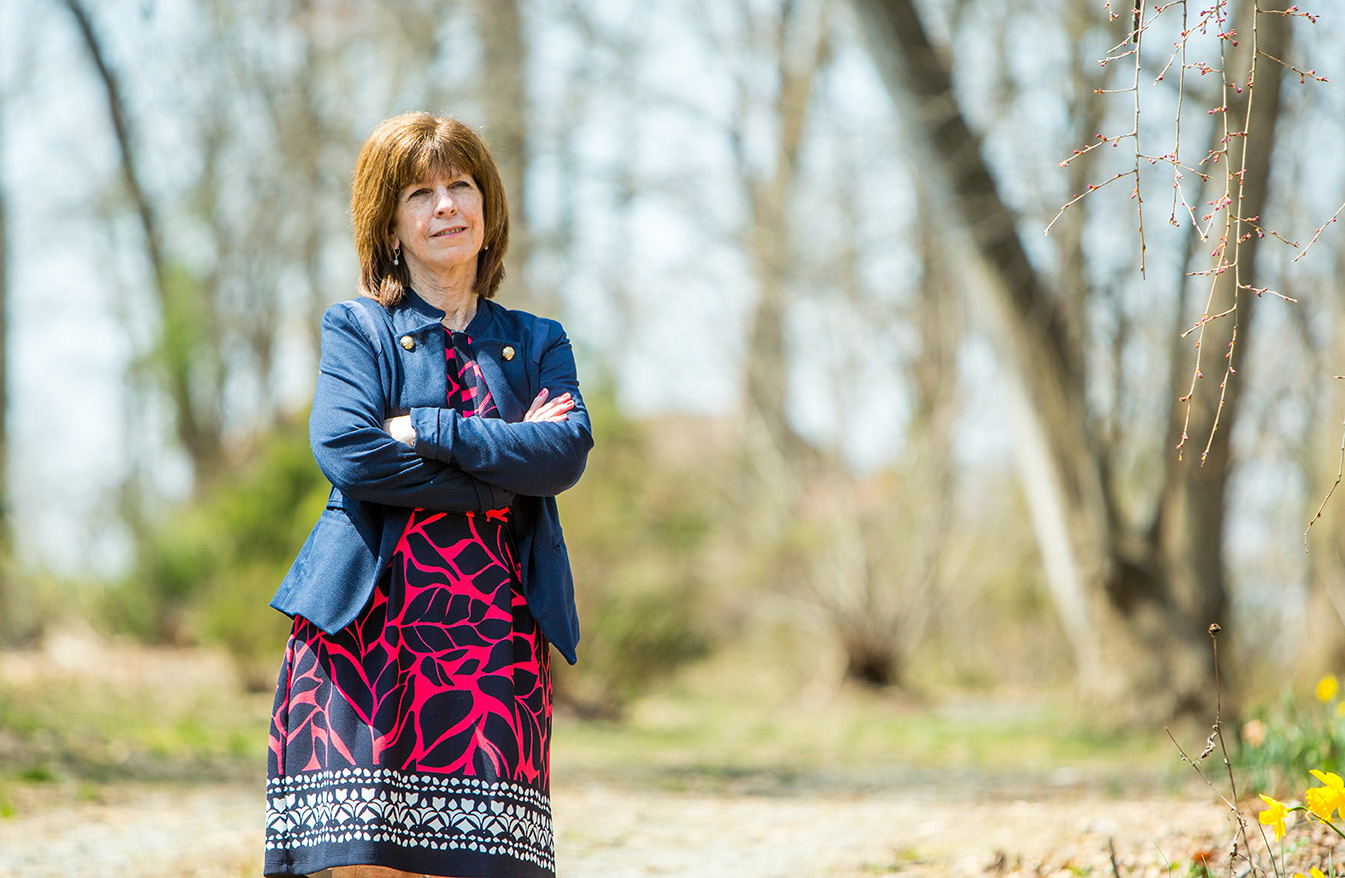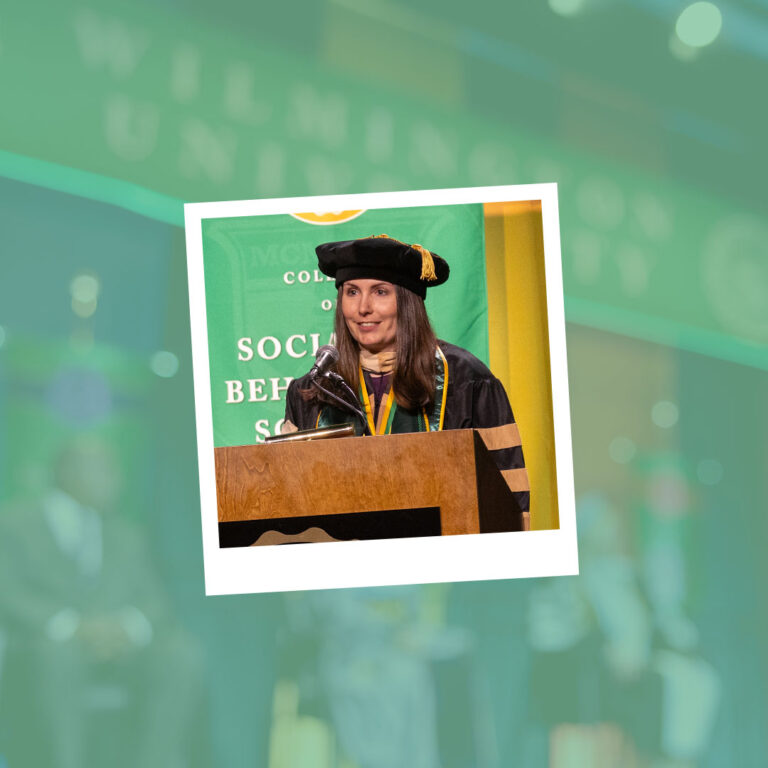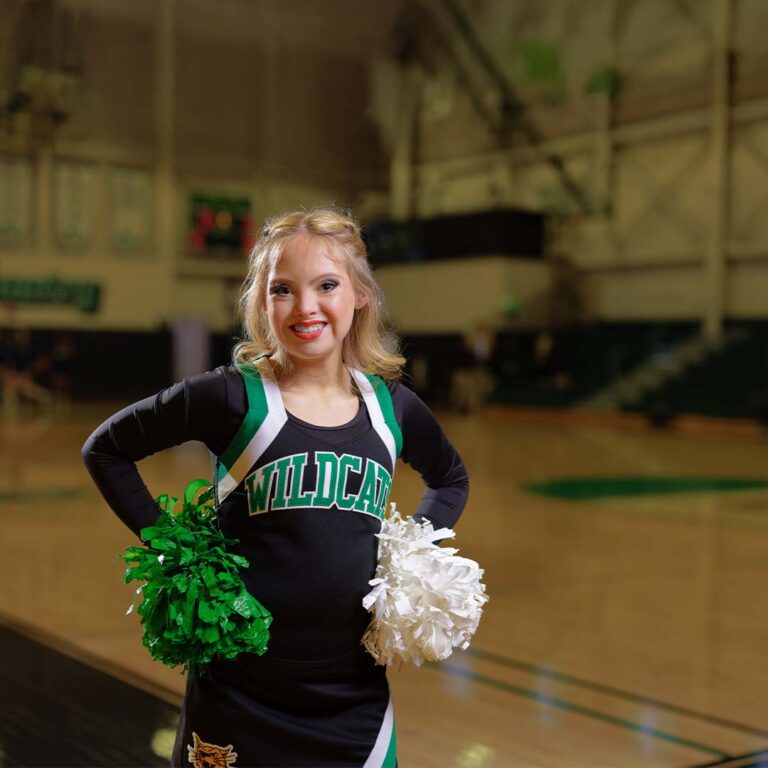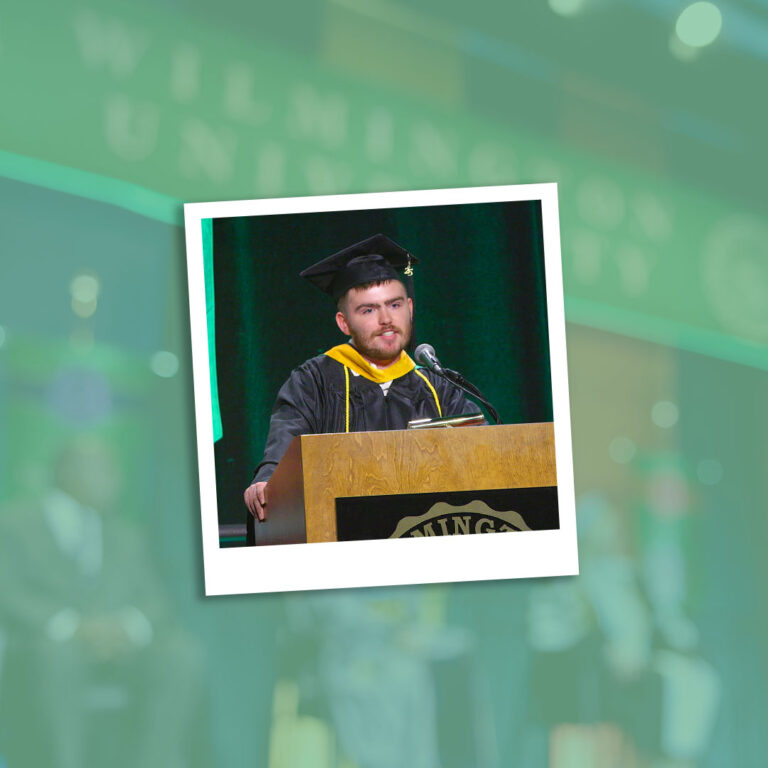Five Minutes at a Time

Surviving unspeakable loss has made Dr. Angela Hermana better teacher, mentor and human being.

When Dr. Angela Herman joined the Wilmington University faculty full-time in 2015, she was asked to transform the former Allied Health program into an innovative and practical offering called Health Sciences. In just three years, the program has grown 200 percent. Much of the recognition goes to Dr. Herman, its chair, though she credits staff and faculty for the significant growth. A nurse by trade, she is passionate about student success and wellness, and is determined to educate the health care industry on the merits of Health Sciences. But amid the success, and for the entire time she has served as a fervent ambassador for Wilmington University, she has carried inside her an enormous burden. She is a beloved mentor, professor and colleague, and teaching is her solace. It is the one thing that has allowed her to thrive despite lingering and indescribable hardships.
Health Sciences, a four-year degree or a completion program, explores multiple areas of health care like policy, research and leadership. It was designed to accommodate a broad population of health care workers like respiratory therapists and dental hygienists, as well as generalists who don’t have specific licenses or pathways. When Dr. Herman came on board, her plan was to serve students who loved the health care industry but were neither nurses nor physicians. “Our students are taught to use evidence-based practice in health care and public health,” she says, “which is the new thing in health care. All of these things are built into the curriculum.”
She needed to educate the public, so she visited high schools to tell students they could either earn an associate degree in Allied Health first or enroll at WilmU right after graduation and earn their four-year degrees. She went to community colleges like Delaware Technical Community College to offer Health Sciences as the next step for graduating students. She developed relationships with many organizational and community leaders, including those at Christiana Care Health System.
“It’s been a wonderful thing to be part of,” says Dr. Herman. “I feel there are several directions that are important for me to take: to expand the number of students who have access to the program, since it’s so new and because after meeting with our community partners about what we should change, it became clear that it was very competitive to get into those career pathways and many great students who had an interest in health care got turned away.”
The former Allied Health program had a business focus because administrators thought that most allied health professionals wanted a bachelor’s to help them climb the management ladder. “But in my investigation for our program review,” says Dr. Herman, “I found that there were several reasons people came back to get their bachelor’s. Health care professions are starting to consider a bachelor’s degree as the entry level for practice, similar to changes happening in the nursing field.”
Others sought careers that required graduate degrees, but first needed to earn bachelor’s degrees to bridge the gap. Physician assistants or occupational therapists, for example, need master’s degrees. Health Sciences was created to support those populations as well.
The business courses decreased while health care courses increased. “We also did something different by offering students elective courses to help them build their own focus,” says Dr. Herman. “So if someone wanted to be a physician assistant, for example, she or he would need more science classes. If they wanted to be a manager, they could add those business courses back in or do a certificate in Human Resources Management.”
Health Sciences aligns with the WilmU mission by treating students as individuals and providing the right courses for specific jobs. “So we encourage them to be thoughtful about what they want to do at the end of this program,” says Dr. Herman. “They don’t all know what that is, but as part of the early classes, we challenge them to look at our certificate programs and ask them what they could do with those. We also encourage them to consider work-integrated learning experiences, or co-ops, particularly the four-year students. We urge them to get out there and work in the community; to create objectives specific to them.”

There have been outstanding co-op offerings for these students. The American Lung Association, for example, offers WilmU students the chance to work in Wilmington elementary schools, where they assist professionals who teach students with asthma about their symptoms. “These are kids who may not have those opportunities to have someone to talk to about asthma,” says Dr. Herman. “Our completion degree students who may have been practicing in their professions for years often have only worked in hospital settings, so co-ops like the one with American Lung offer them alternative settings outside of the acute care area, such as schools.”
Dr. David Caffo, director of Work-Integrated Learning, says that students can either integrate co-ops with core curriculums or build them as electives. “Angie is very innovative in her approach to her program and has embraced the work-integrated learning modality of teaching,” he says. “She gets that experience is what sets our students apart. Her work with experiential learning gives our students the tools and confidence they need to be successful.”
She’s focused on the job market, too. A student who has earned a bachelor’s degree and is already working in allied health has a better chance of getting promoted. Other graduates can find work in numerous fields, such as care coordination, particularly as America ages. More nurses are expected to retire, so the need for support services will increase. Employers will also need prevention professionals to assist doctors or nurses with employee assessments. There are opportunities for medical supervisors and research assistants, and the list for potential careers is growing.
Dr. Herman works with local facilities, including Christiana Care Health Systems’ Care Management program, where she talks about WilmU’s curriculum and informs outside professionals of the training students get. She listens to what the professionals say. “If there’s something that’s missing in our students’ preparation, let’s add it,” she says. “I’m always glad to hear what will make our students more marketable.”
WilmU’s Health Sciences offering is distinctive. Most university programs have specific tracks, but WilmU students can plan individual programs. “Health Sciences graduates are passionate about their prospects,” says Dr. Herman. “This gives them an opportunity to make a difference in the health of the population around them. We want to open their eyes as to what that might be.”
Whether it’s in public health, care in a hospital setting, or working in policy, Health Sciences graduates can enact change. Their teachers are helping them understand that they can make a difference.
This is a message that Dr. Herman is passionate about, and despite her personal struggles, her energy has never wavered. She has carried the weight of the world on her shoulders, and her work has lightened that load.
A native Delawarean, Dr. Herman attended Lake Forest High School and grew up in Harrington, in the shadows of the Delaware State Fair. Her 96-year-old mother, Anne Minner, is a fair board director, so the Delaware tradition is in her blood. She never misses the fair.
She earned two nursing degrees (BSN and MS) at the University of Delaware and her Doctor of Nursing Practice (DNP) degree at Wilmington University. She worked as a staff nurse at the Veteran’s Administration Hospital in Wilmington for two years in the early 1980s, then joined the Delaware Medical Center staff (now Christiana Care) and worked there until 2015, serving in various intensive care areas, first as a manager and then as a member of the Medical Center’s Critical Care per diem pool.
“Nursing makes you very inquisitive,” says Dr. Herman. “Medicine is a mystery. It’s about finding out what’s going on with someone. Nursing is the holistic view of that. Not only do nurses learn about symptoms; we also help patients cope with them.”
The bulk of her career involved working within the cardiovascular clinical trials program that included research trials in all cardiovascular areas (cardiology, interventional cardiology, radiology, cardiac surgery, electrophysiology and vascular surgery). In 1991, she had started the program at Christiana Care in its cardiovascular research division. Christiana wanted someone with ICU experience, management skills and a master’s degree. Few nurses had graduate degrees then, so Dr. Herman earned the privilege of working with new drug research and investigation and other topics related to cardiac medicine.
She started teaching as a WilmU adjunct in 2002. (One of her coworkers was a BSN student and learned of an opening.) By that time, she had two daughters in college and a young son, and was “blown away” by how much she loved teaching research. “It was so powerful,” she says. “I just love teaching research because it’s a topic students are afraid of. I had such an advantage of working with research so I had lots of stories to help explain it. I loved walking through the halls at Christiana and seeing how many nurses were excited about research because of their classes at WilmU. So many nurses in Delaware come to WilmU.”
“Dr. Herman has a wonderfully unique attitude toward life and the people around her,” says Dr. Jim Wilson, vice president for Academic Affairs. “Our students are fortunate to have the opportunity to engage with such a caring, understanding and compassionate faculty member.”
She taught as an adjunct until 2015, when her current position became available. She loved the collegial atmosphere, her colleagues and especially her students. The University provided the quality of life she desired.
And that life — and her job — would soon see
Dr. Herman through her most trying time, literally saving her life.
Dr. Herman’s first marriage ended in divorce, but the couple produced three children: Natalie, Caroline and Peter, their youngest. After the girls left for college, Peter remained, their mother-son bond cemented by a traumatic event when Peter was just 2: He fell into a pond on the family’s property in rural Kemblesville, Pennsylvania, and when his mother found him, he was barely breathing.
“I had to perform CPR on him,” she says, remembering the torment of waiting for the ambulance. The driver couldn’t find the house because two streets had the same name. But the other paramedic recognized the address because his sister had babysat for the girls. Peter was helicoptered to Christiana Hospital, where he survived.
Peter left the nest for the University of Delaware. The future entrepreneur and fervent Baltimore Ravens and Miami Heat fan thrived at UD, studying business while becoming a music producer and lacrosse team co-captain. He had even started developing movie scripts. At 20, he moved to an apartment off-campus.
On Nov. 7, 2012, his mom took him to Costco to buy “hundreds of dollars of food,” she says with a smile, remembering how Peter could eat, how college students never seem to get enough food, and how moms never tire of buying it for them.
Dr. Herman’s interview at WilmU for the DNP program happened to fall on the same day. “So I loaded up his car,” she says, “but I felt so horrible because Peter said, ‘Hey mom, let’s get something to eat.’ I said I couldn’t. I had to go to the interview, but that we’d do it later.”
She recalls watching him drive away in his small green car, eating something out of a grocery bag.
Five days later, Peter was shot and killed.

When she got the call from Peter’s father alerting her to the shooting, he told her that Peter was helicoptered to Christiana. She thought about the day long ago at the pond, and how Peter survived. “I was so certain he was gone back then, but my friend told me he was OK. I kept thinking it would be the same this time and that Peter would be saved. But he wasn’t.”
The date of her DNP interview is seared into her memory. It was the last time she saw her son. Her acceptance letter to the program came amid a flurry of sympathy cards. “I remember opening it up and thinking I just can’t do this. But I thought about it a lot, and getting a doctorate was a long-time dream. I knew the DNP was a good fit.” She also knew that Peter would have wanted her to become a doctor, and that the program might provide an escape from the agony of losing a child.
“When Peter died, Wilmington University was wonderful to me,” says Dr. Herman. “They told me not to worry about my classes. But I came back within a week and every single person was so good to me. Every student came up to me and gave me a hug. Peter was so young and so many people came to the service.”
That support got her through the most difficult moments of her life. Little did she know that more would follow.
A few months after Peter’s death, in the spring of 2013, Dr. Herman’s then fiancé, Michael Herman, started to experience severe pain in his ribs. An x-ray revealed nothing and a battery of tests presented only anemia. A hematologist then labeled Michael’s symptoms as a Vitamin B12 deficiency.
But something wasn’t right, at least not to an experienced nurse like his fiancée. She conducted her own research and discovered that the symptoms of multiple myeloma, a blood cancer, mirrored Michael’s.
She requested a bone survey (a series of x-rays of every bone in the body). On the way home from the test, they drove by a house in Galena, Maryland, that they had always loved and that had just become available. Michael bought the house the following Tuesday. Two days later, he was, indeed, diagnosed with multiple myeloma. He had 100 lesions in his body and was ordered to start immediate treatment.
If there was a time for Dr. Herman’s faith to be shattered, this was it. “I thought, ‘How can this be?’” she says. “I lost my son and now I’m going to lose my husband-to-be?”
They didn’t waste time. “I said we’re going to get married and we’re going to live in this house we just bought,” she says. “We moved in in July and got married in September.”
Throughout all this, she had been working on her doctorate. “But I realized I couldn’t be doing research for a Discussion Board when I should be researching how to keep my husband alive.”
She dropped out of WilmU’s first DNP cohort. By January, Michael had gone to Arkansas for treatments with the renowned Dr. Bart Barlogie (originally from The University of Texas MD Anderson Cancer Center) at a center built by Walmart founder Sam Walton, who also had multiple myeloma. Michael stayed there for nine months, and family members took turns while he endured two stem cell transplants. Dr. Barlogie moved to Mount Sinai Hospital in New York City in 2015, and the couple now travels there for treatments.
Time went on, albeit slowly and painfully. Cohort One had long finished and by that point, Cohort Six would soon commence. Enter Dr. Aaron Sebach, chair of the Doctor of Nursing Practice program.
“It took me about a year to convince Angela to return to the DNP program,” says Dr. Sebach. “I kept bringing it up in conversation and sending degree plans. I knew that earning a terminal degree in nursing was a personal and professional goal of hers and I was determined to assist her in reaching that goal. With her extensive background as a clinical nurse specialist and researcher, coupled with her perseverance, I was confident that she would be successful. She seamlessly integrated into our sixth cohort and served as a role model for other students. Her doctoral project combined her expertise as a clinician, researcher and educator to implement a clinical practice change at a small community-based hospital in Maryland.”
She kept her eyes on the prize, he adds. “She never let the death of her son or the health of her husband hinder her success. Angela graduated at the top of her class and proudly delivered a speech at the doctoral hooding ceremony highlighting her doctoral journey. I don’t think that there was a dry eye in the room.”
In that speech, she revealed that the date of her DNP interview was also the last day she saw Peter. When she walked across the stage to don her tam, her emotions covered the gamut, from sadness and regret to joy and triumph. “Peter would have been proud,” she says. “He was with me.”
Dr. Herman’s two daughters, Natalie and Caroline, are both successful business professionals. But Peter’s death left a hole in their lives. “It never goes away,” says Dr. Herman. “Every birthday, every holiday: You feel that loss of what your life should have been and never will be. And you just miss him.”
One of Peter’s friends gave her a recording of a song his friends had written for him and played at his service. They had also recorded his laugh and tagged it to the end of the song. “So I have his laughter,” says Dr. Herman. “I can’t listen to the song much, but I can always hear his laugh.”
The Hermans give a scholarship every year in Peter’s name to an Appoquinimink High School lacrosse player who embodies Peter’s spirit and leadership abilities. Peter was part of the first graduating class at Appoquinimink.
Dr. Herman takes nothing for granted. “You realize you don’t know what’s coming at you,” she says. “Obviously I would have thought Peter’s death was enough. I would not have thought I would have a husband who had to battle cancer. Cancer has defined our life.”
Every day counts, she says. “When someone else loses a child around Peter’s age, part of me wants to help them, but I don’t know how. The reality is that it hurts. It sounds cliché, but you have to take one minute at a time. If I can just get through the next five minutes, maybe I can get through the next five minutes.”
The tragedies have changed her. “I always had a strong faith, but it does harden you a bit,” she says. “I think I’m a good person and sometimes I ask why these two events happened to me. But at the end of the day, I think about the wonderful life I had, and have, and I realize there are no guarantees. There are people who deal with so many other things.”
Being present for her daughters and meeting work obligations keeps her going. “Those things help you,” she says. “Those girls are there for me and this job saved me. The people at WilmU care and they let me be with my husband when I need to be.”
Doing what she loves has aided the healing process. Michael, who is in near-complete remission, often reminds his wife about the good times with Peter. And earning her DNP made the pain somewhat less acute. “You’re moving yourself forward and hopefully showing other people that it’s a mechanism to help,” she says.
Nurses like Dr. Herman tend to be naturally compassionate. “But until you lose a child or deal with a loved one with cancer,” she says, “you don’t understand how truly painful these things are. I think that makes me a more understanding teacher, particularly with students who have challenges. I can help them look beyond them so they’ll be successful. I can better help them meet their educational goals.”
Still, some days are worse than others. She never worried about petty things anyway and after the past few years, she doesn’t sweat the small stuff. “I don’t think there will ever be the pain I felt by losing Peter,” she says. “When you put that as a baseline, and having Michael be so sick, it’s hard to get upset about anything.”
She does worry that people find her cold or unemotional. “I wonder if they say, ‘Why don’t you cry?’, and I think it’s partly because if I start crying, I won’t stop. You have to put those barriers up as a professional. You can’t let it have power over you.”
For now, she and Michael enjoy every day in their dream home. And it just happens that Diane Bansbach, chair of WilmU’s Math department in the College of Arts & Sciences, lives a few houses down the road.
“We share fun times,” says Bansbach. “We watched the Eagles huge Super Bowl win together. And we share a great loss: she lost her third child to violence and I lost my third child to a genetic defect. She is so very kind and would do anything for anyone.”
There’s no accounting for the bad things that good people endure. “It’s really about how you’re able to respond to them,” says Dr. Herman. “You have to continue to help others and do what’s important for them.” WU
For more information about the Health Sciences program, visit http://www.wilmu.edu/health/health-sciences.
– Cover Story by Maria Hess



